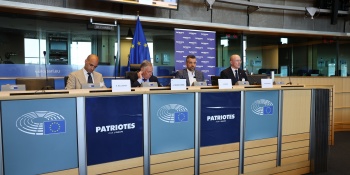Published: 06.08.2021

• Collegium Intermarium has inaugurated the European Integration Research Center.
• The beginning of the Center's activity was marked by the presentation of the report "Between a Europe of nations and a superstate" by experts from Collegium Intermarium and the Ordo Iuris Institute.
• Scientists and MEPs from several countries also took part in the event.
• The authors of the publication point out that EU authorities consistently exceed their authority in areas such as family law as well as social, immigration, and health policy.
• As the report shows, federalization tendencies only favor the richest EU members, leading to growing disproportions in the development level of individual countries.
The report underlines that jurisdiction of the European Union is limited by the powers granted to it in the Treaties and by the principles of subsidiarity and proportionality. In line with the Treaty on the European Union, the principle of subsidiarity (assistance) is based on the fact that the EU may take initiative on matters that do not fall within its exclusive scope of authority only when the intended objectives cannot be sufficiently achieved by the Member States. Moreover, the legal doctrine and jurisprudence of the Court of Justice of the European Union confirm that the essence of subsidiarity is reflected in the decision-making process at the level closest to the citizens, i.e. at the level of state governments.
An example of the negative effects of federalisation efforts is the disproportion between the level of development of individual countries that have adopted the common currency. In the years 1999-2019, the gap between the level of GDP per capita in countries such as Spain, Greece, Italy, and Portugal increased compared to the euro zone average. On the other hand, the richest countries benefited the most from monetary integration. For example, in 1999, the GDP of Italy and Germany was at a similar level. In 2019, the difference was almost USD 14,000 in favor of Germany.
The European Union often interferes with substantive family law, in violation of the powers conferred upon it. In 2018, the CJEU ruled that Member States should recognize "same-sex marriages" concluded in other countries under the Free Movement Directive. This is an unauthorized interference in the Polish legal order which constitutes a violation of Art. 18 of the Polish Constitution. Moreover, the initial assumptions of the draft regulation on the recognition of parenthood between Member States indicate that its aim will be to effect recognition of adoptions made by same-sex couples in another country.
The EU's interference in health policy is also increasing. Since the 1980s, EU institutions have put more and more pressure on the promotion of “reproductive and sexual rights”, primarily reflect in unlimited access to abortion and contraception. This is one of the goal of the "EU Program for Health", adopted in the form of a regulation. The federalisation aspirations are also clear in the EU’s migration policy, as Frontex is being granted more and more powers in the scope of border protection. The EU has also proposed to grant the European Asylum Support Office with authority to provide asylum, dedicated thus far solely to Member States.
These are just some of the many aspects in which EU institutions interfere to a greater extent than the Treaties provide for. Only the richest countries of the European community benefit from the described trends. Current efforts also show the inaptitude and failure of EU bodies in crisis situations. The Covid-19 pandemic is just one of many such situations, where the Union was completely inefficient and unable to create unbiassed solutions to widespread problems. Taking all of these matters into account, the authors of the report advocate for, inter alia, the deregulation of numerous areas covered by EU legislation, especially in areas where it does not bring the intended results and violates the principle of subsidiarity.

Wednesday's presentation in Brussels of the European Union reform plan developed by Poland’s Ordo Iuris Institute and Hungary’s Mathias Corvinus Collegium garnered significant interest. Nearly a hundred MEPs and their staff from many countries came to the presentation of this proposal.

• The pressure on the European Union’s southern borders has continued unabated since the great migration crisis of 2015.

23.05.2025
We are currently engaging with think tanks and political parties across the continent to collaboratively develop a detailed counter-proposal to the centralist, anti-national, and anti-democratic vision of the European Union promoted by the European Parliament and President Macron.

19.05.2025
• The 78th World Health Assembly, the deliberative body of the World Health Organization, begins today in Geneva.